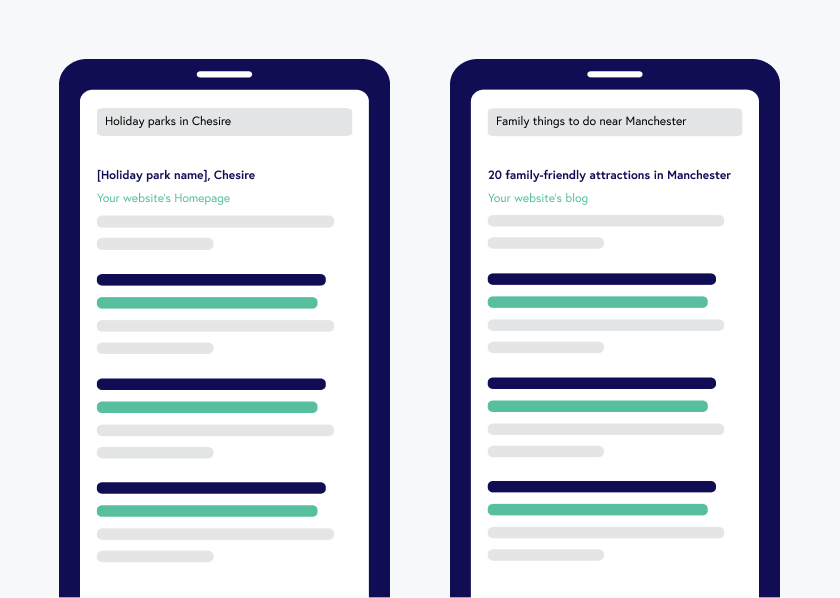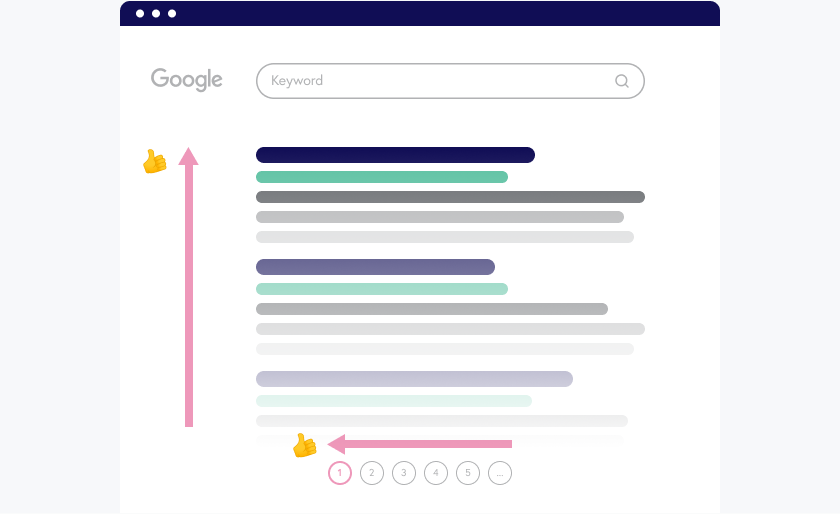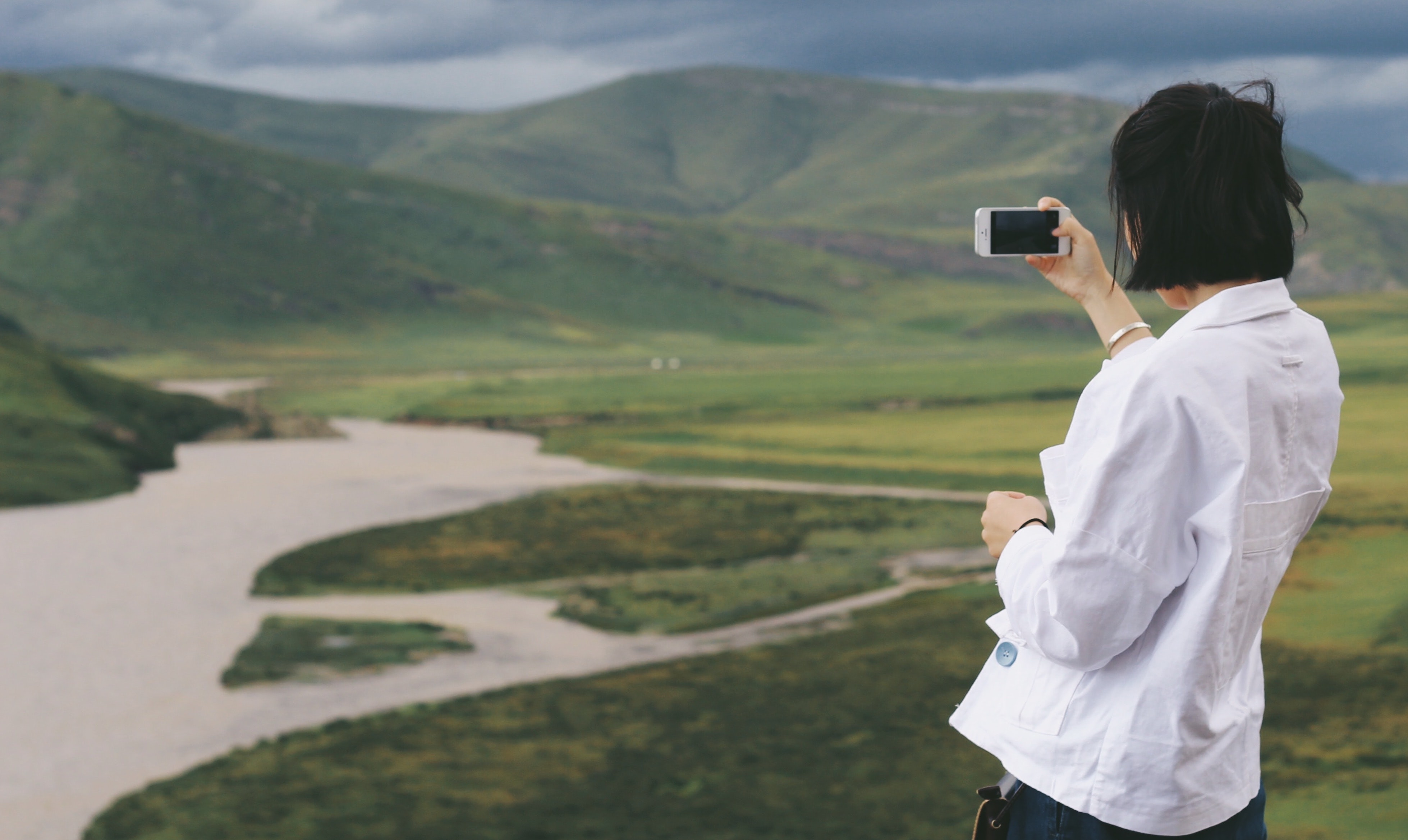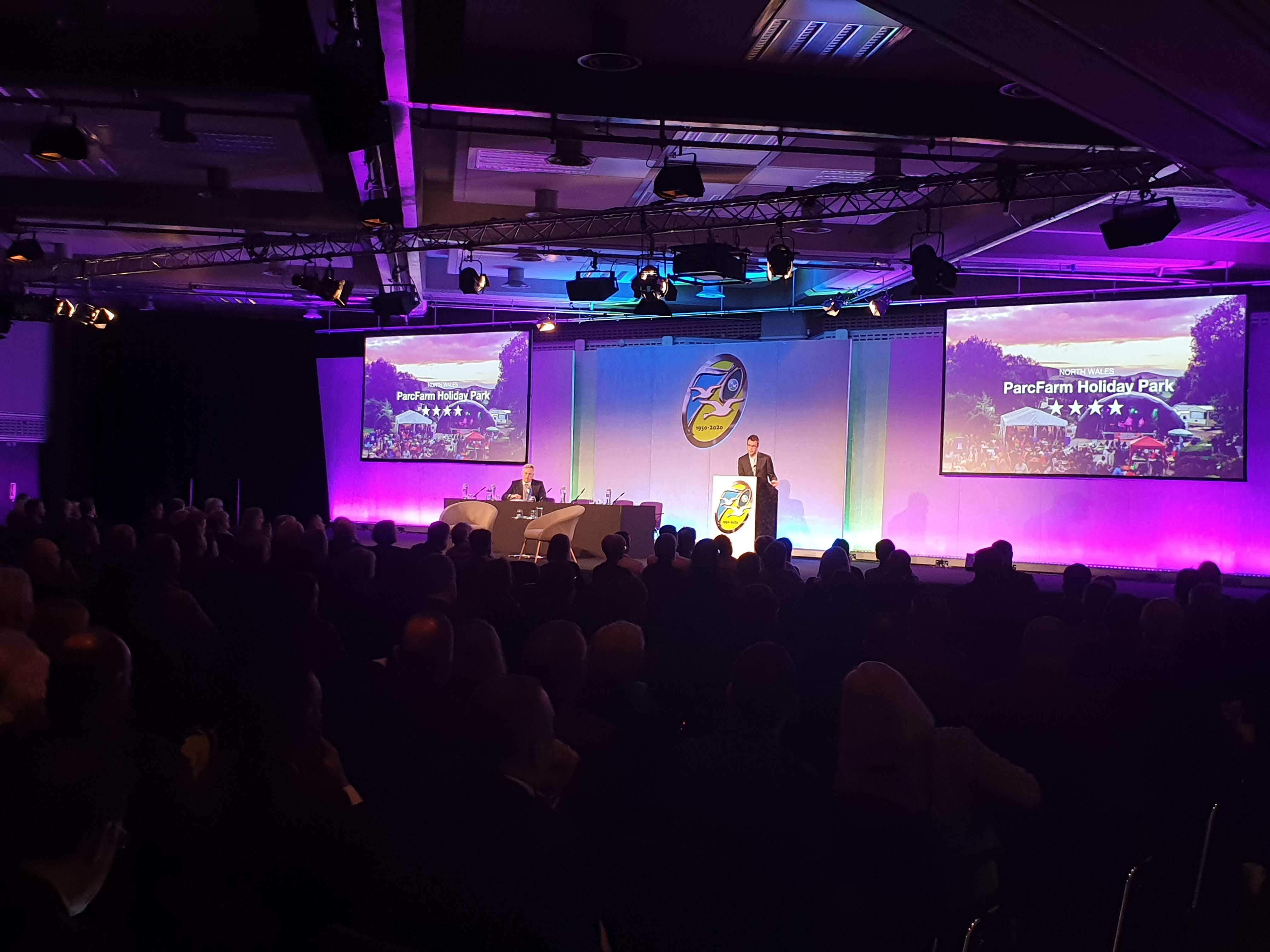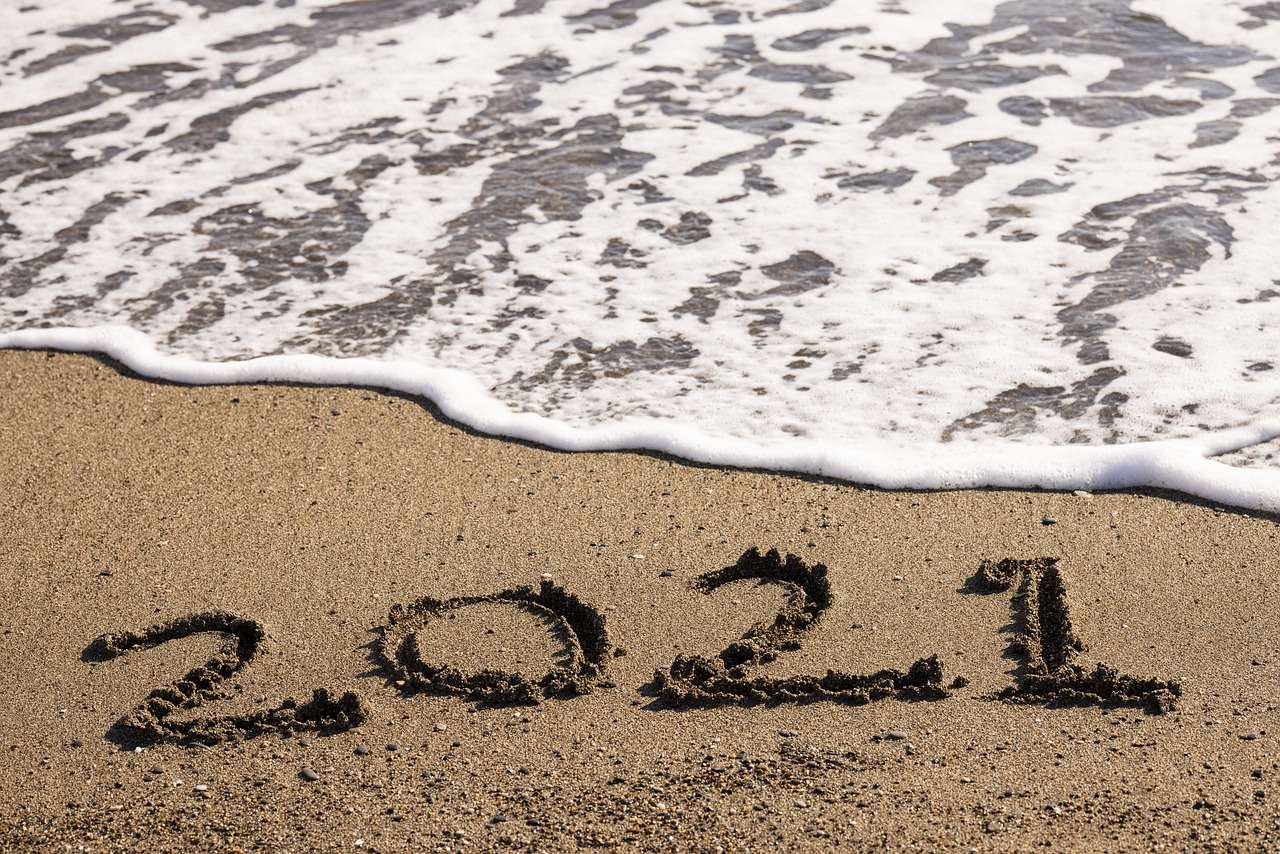Paid or Organic Marketing: Which works better for holiday parks?
Feature Article
You may have seen the terms ‘paid’ and ‘organic’ bandied around when it comes to marketing. But what do they mean? And more importantly, which one works best for holiday parks and campsites?
We’re diving into the differences between the two, when to use one or the other, and which will get you more bang for your buck...
Spoiler alert: They’re most effective together, but we’ll tell you why later.
Paid and Organic Marketing definitions
Before we compare, we want to clear up exactly what paid and organic marketing are, as there are a lot of misconceptions about the two. So below we’ve written some basic definitions.
It’s worth noting that these aren’t the only types of marketing you can do, but they’re two of the most important. By having a better understanding of them, you’ll know when to use them, (or at least you’ll be able to expertly reference them should the conversation ever arise).
What is Paid Marketing?
Paid Marketing results in the adverts you see around the internet, they can also be referred to as ‘paid ads’.
Examples include the text-based ads at the top of a Google search, images on other websites, boosted posts on Facebook… Once you start looking for them, they pop up everywhere.
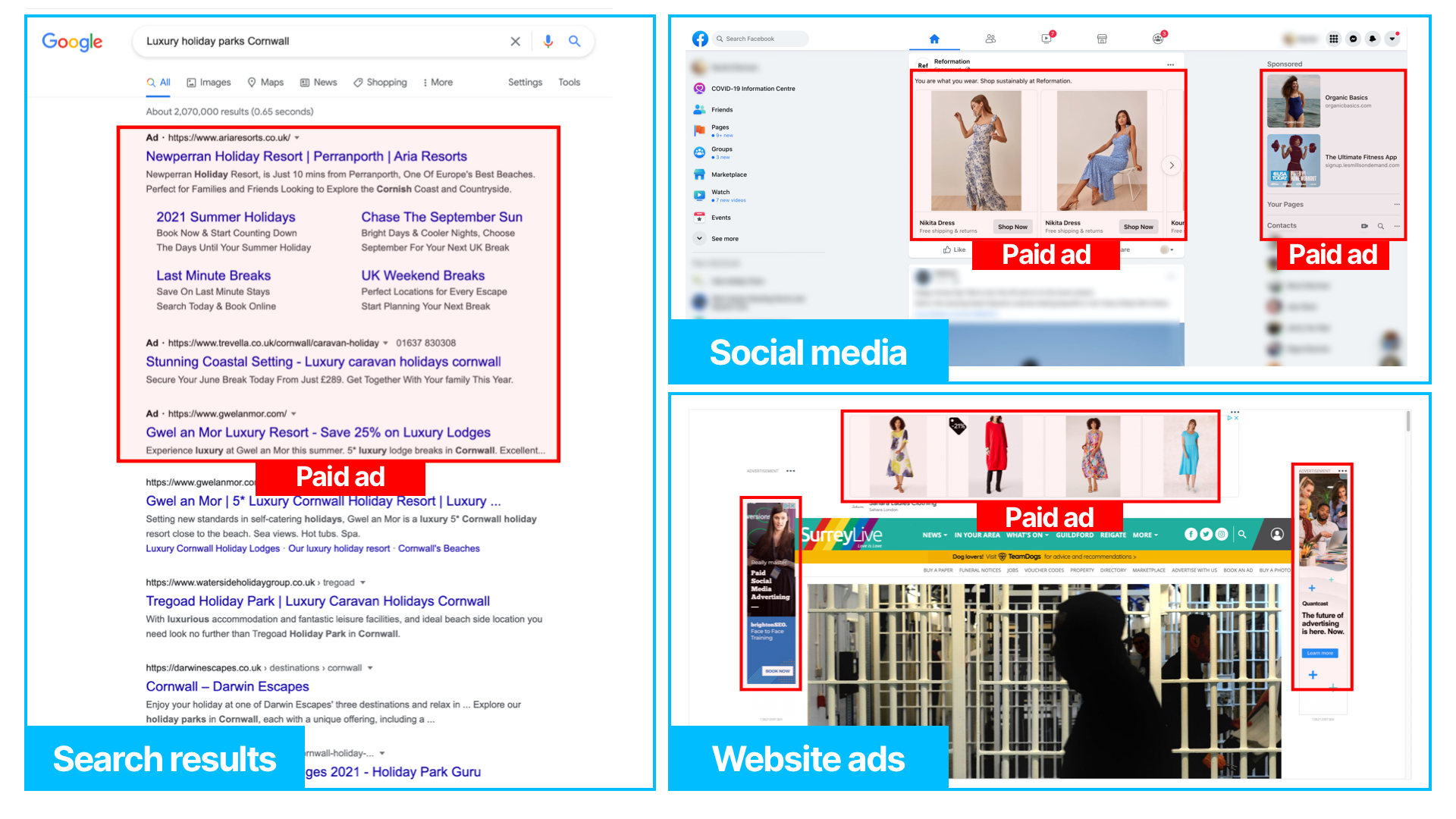
Examples of paid adverts
They’re called ‘paid’ marketing because you pay for advertising space on a website to promote your business.
Different websites offer different types of advertising. The most common forms of paid marketing for the holiday park industry are Facebook Ads and Google Ads. Though many others offer advertising capabilities, for the purpose of this article, we’re going to be focusing on these two (which can act as blueprints for social media advertising and search engine advertising respectively).
What is Organic Marketing?
Organic marketing refers to marketing that brings people to your website because they’ve been searching for something online and you appear as a result.
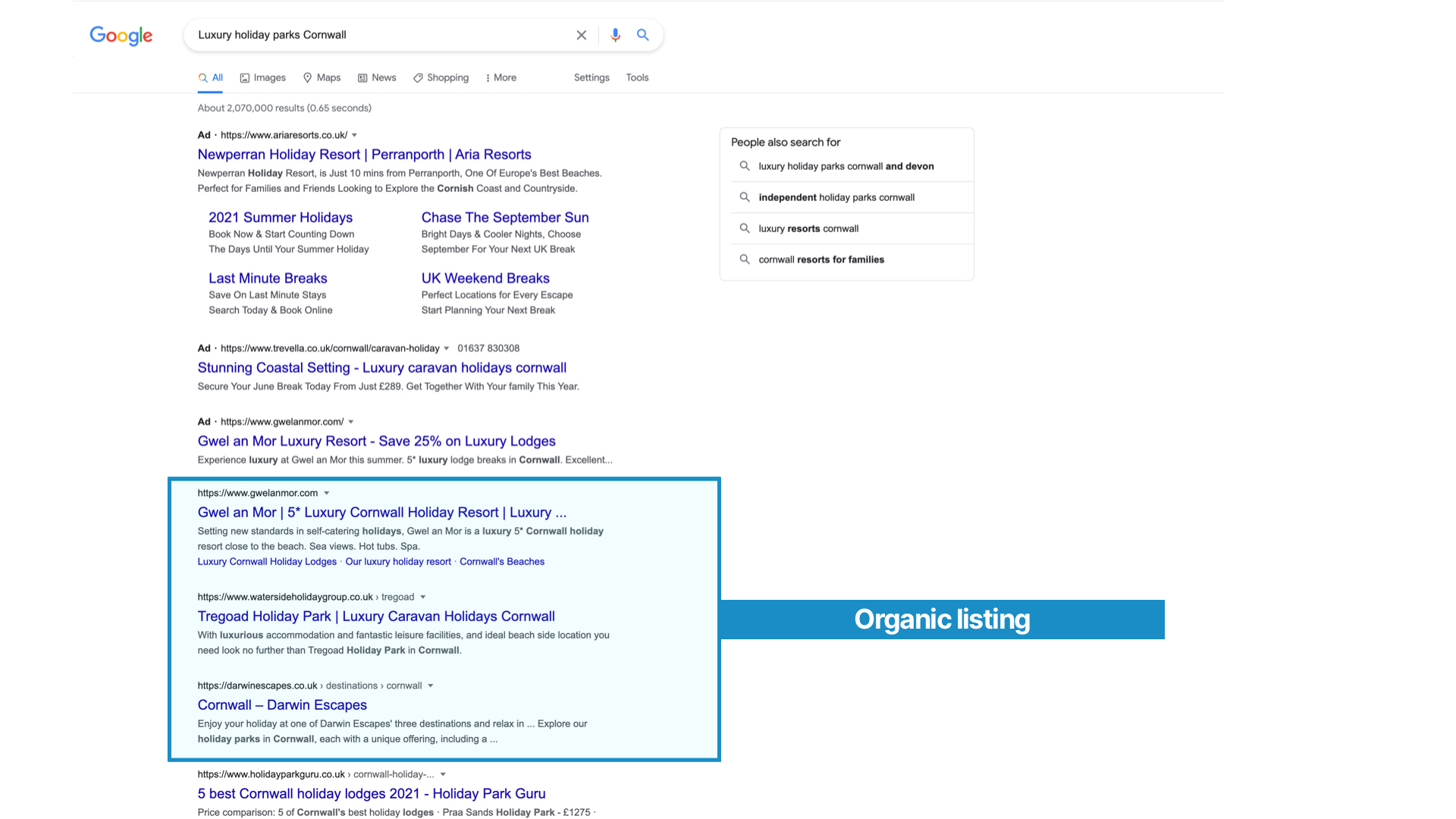
Organic marketing: This is an organic listing on the first page of Google
Again for holiday parks, the usual ways this happens includes:
1. Having lots of high quality content on your website, from blog posts to informative landing pages. This means when someone searches on Google for something (such as ‘caravan sites near Scarborough’) if there’s text on your website about Scarborough, you’re more likely to show up on the results page than a website that doesn’t mention it.
2. Undertaking SEO (Search Engine Optimisation). SEO involves tweaking parts of your website to be more favourable to search engines. It can be from little things, like using keywords or compressing images so pages load faster, to more technical elements developers use to improve your website.
Make no mistake, content and SEO are complex subjects in themselves! Getting on the first page of search engine results can be difficult (Google purposefully never reveals exactly how it decides what’s on the first page).
However, if someone chooses to never make updates to a bare-bones website, they will not benefit from organic marketing. Trying to write content on topics people may be interested in regarding your park is the first step on the path to organic marketing success.
The key difference is that organic marketing exists to entice people to your website over the long term. Whereas, paid marketing costs money every time someone sees an advert and if you stop paying, the adverts stop running.
An example of the two from the same company:
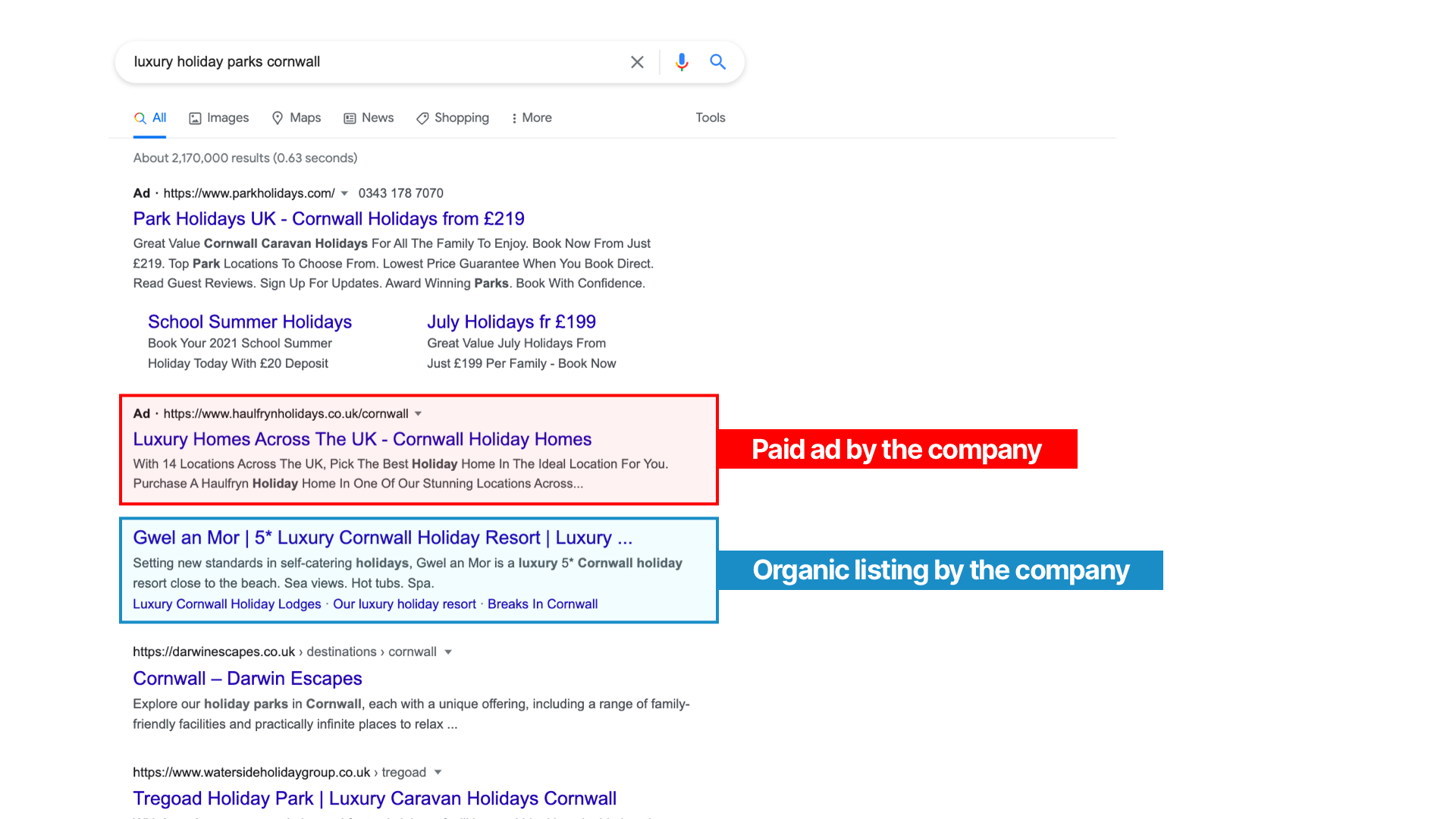
Two listings from the same company when you search for ‘luxury holiday parks Cornwall’
As you can see, you can get away with being much more self-promotional on paid advertising than organic marketing. If you’re paying to appear on the internet in front of potential customers, you might as well put your best foot forward, and entice people to click on the ad with something unusual or intriguing (such as a special offer).
Whereas, an organic result will only appear when someone has searched for it, so they’re already more invested in clicking through to your website.
What are the benefits of paid or organic marketing for holiday parks?
We’re breaking down the pros and cons of paid vs organic marketing, based on our 10+ years of experience in running both for the leisure industry.
The usual route: Organic Marketing
Most holiday parks and small businesses stick primarily to organic marketing because it’s less complex and doesn’t cost a penny.
Going back to our earlier example, let’s say you have a blog post on the best dog-friendly things to do in Scarborough, this can attract lots of people searching for attractions that welcome dogs in the area. They might not have even been looking for a holiday, but through this blog post are then introduced to the caravan site website.
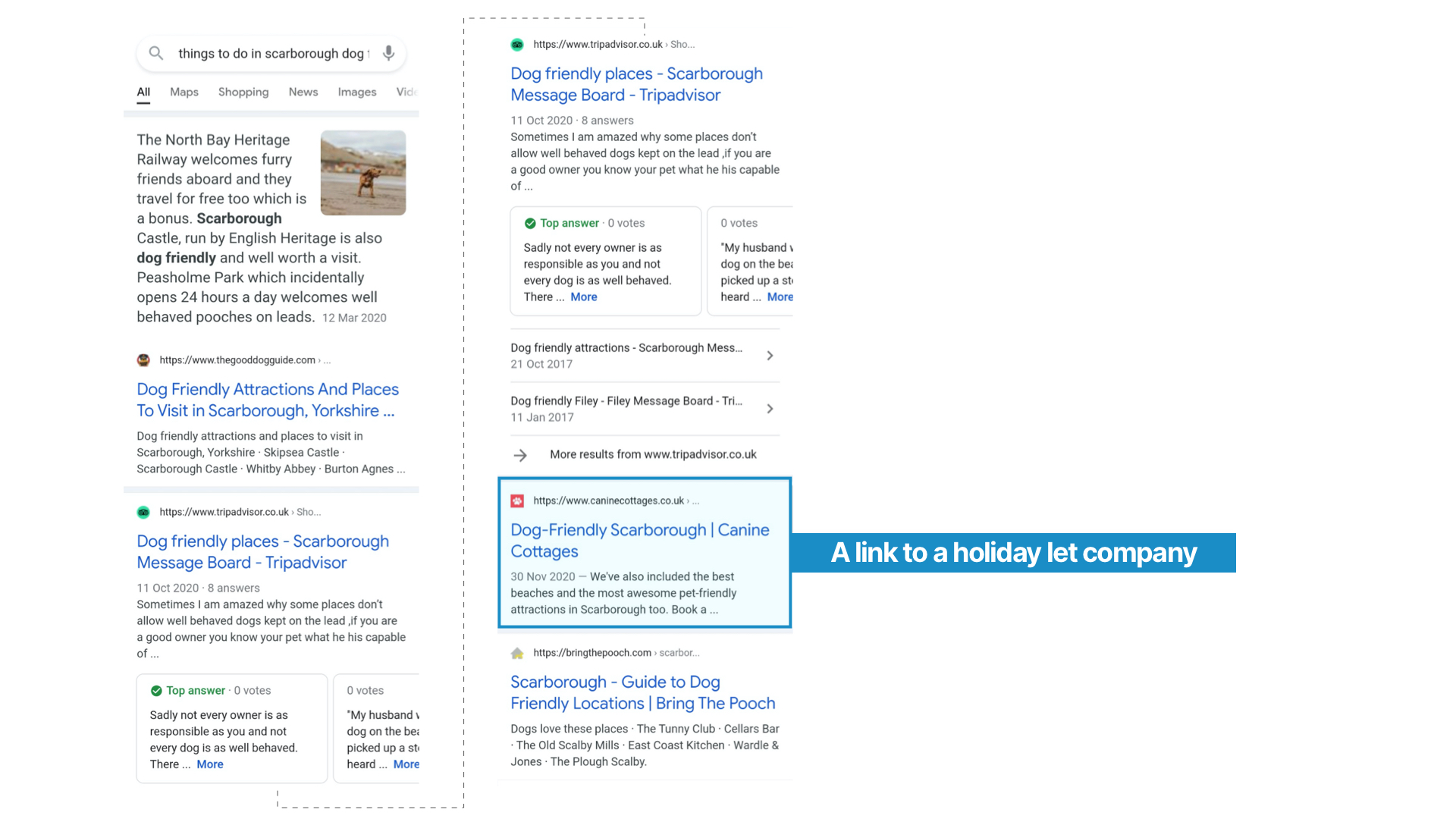
The 4th organic listing when typing in this example search term about dog-friendly things to do in Scarborough is linking to a holiday letting company
Over time, organic marketing will help build your park’s website popularity organically (hence the name). BUT it can take a lot of time and sometimes, it simply doesn’t perform that well. There’s a statistic that 90% of the internet’s content doesn’t get any traffic, so ensuring that you’re in the 10% is important.
(Wondering how to get into that 10%? We have a guide all about writing high quality content, available to Park Kit customers only)
Plus it can be really difficult to know what is actually working with organic marketing. You could spend hours a week writing blog posts, but do people actually book holidays as a result of them? Unless you’re savvy at measuring campaigns’ performances, it can be tricky to tell.
Therein lies the appeal of paid marketing...
Paid Marketing benefits
If you want results, and you want them fast, look no further than paid marketing!
Paid ads can act as a real stepping stone for successful marketing. As soon as you create an advert, it will be shown to a large group of people (you can even target specific demographics to view your ads).
Plus, paid ads often hold prominent positions around the internet. Whether it’s at the top of a search engine results page or website. Or integrated into how you use a website such as part of your newsfeed in Facebook, or within Instagram stories.
Examples of when to use paid marketing
We’ve also listed some scenarios when paid ads can really shine for holiday parks:
- If a competitor is bidding on your name (or other brand terms)
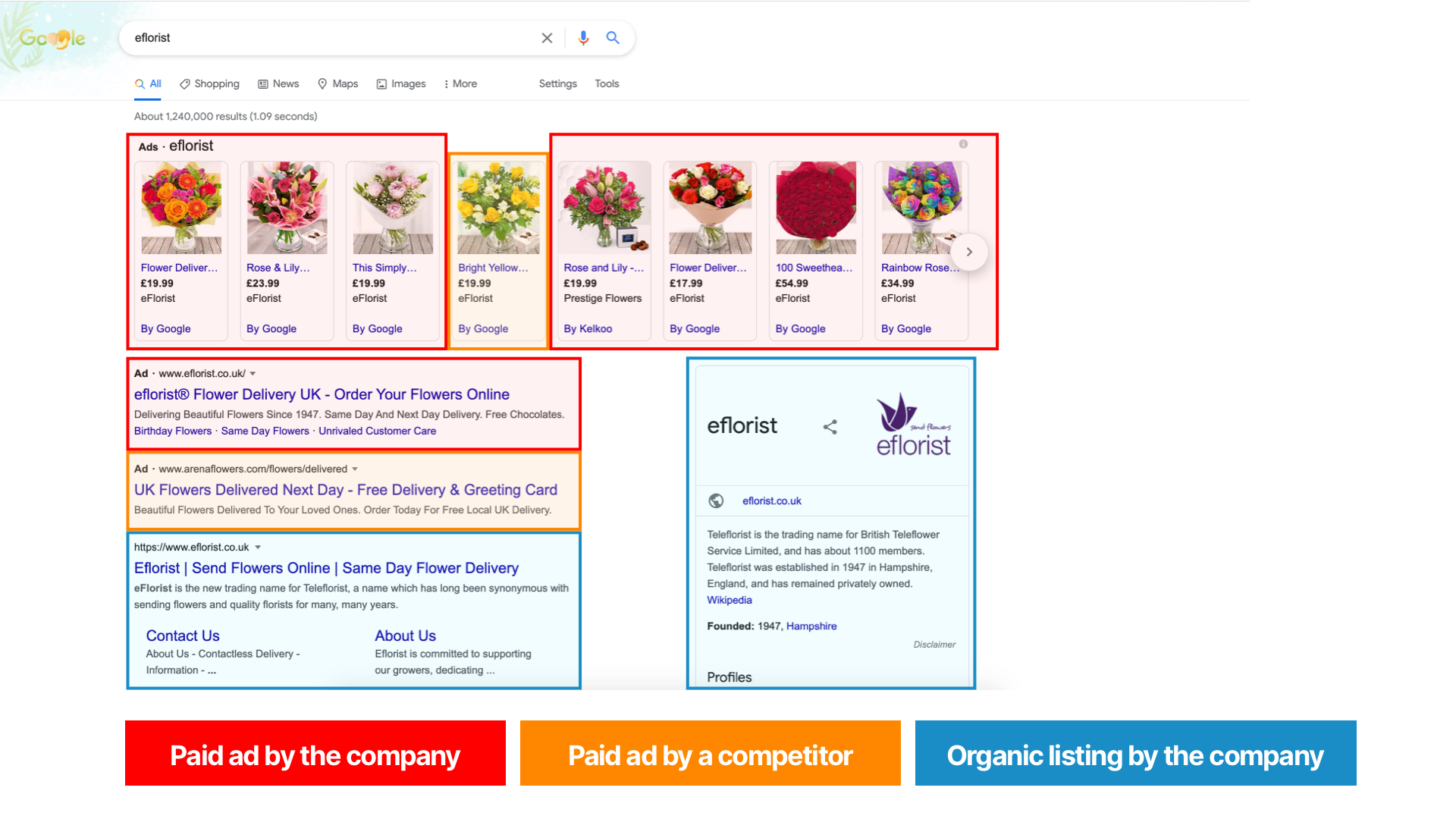
Other companies can try to attract people looking for your holiday park
Unless you have a trademark, there is nothing stopping a competitor from paying money to appear when people type your park name into a search engine. As paid ads appear above organic listings, if you’re not running ads, they will appear above you. This can then lead to people searching for you but clicking on the competitor ad and going to their website instead.
In this instance, by paying for a Google Ad, you will almost certainly appear above them (search engines will recognise that your website reflects that advertising campaign better than the competitor’s) and so you should lose minimal traffic. Meanwhile, they’ll be paying for underperforming ads.
- If you share a name with other holiday parks
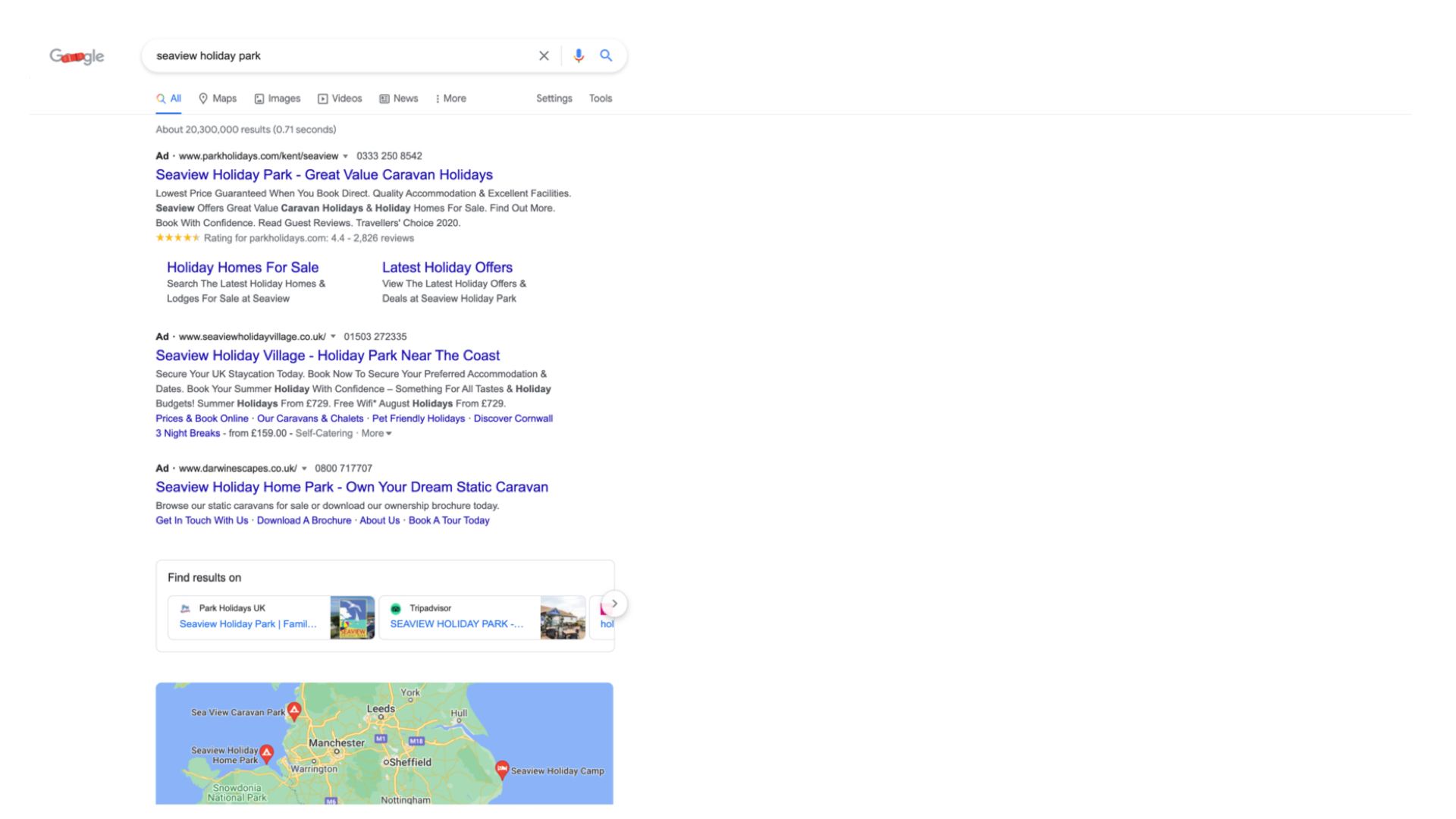
If people are searching for you, you don’t want a park on the other side of the country appearing
There are a lot of holiday parks that share the same names, which can be potentially confusing for people searching for you online. A paid ad may not guarantee that you’ll be at the top of the search engine results, but you’ll at least be above the organic listings.
- To promote something exciting happening at your park
If you’re doing something on your park/website which you want to draw attention to, paid ads are a great way to let people know it exists. Especially if there is an element of time sensitivity, you can make sure that plenty of new people see that you’re running that special offer, competition, open day, etc.
- If you’re nowhere near the first page of Google
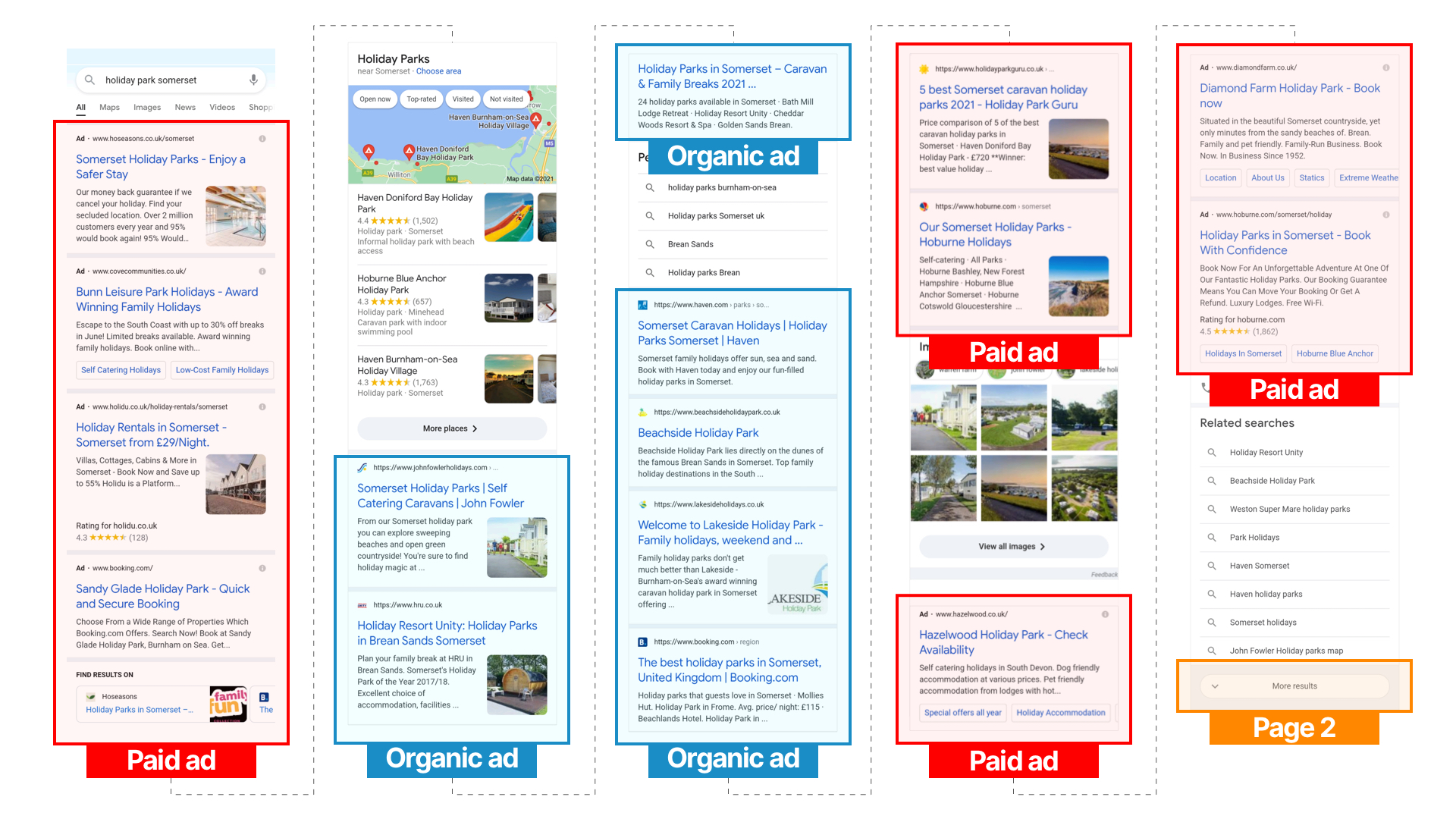
Google gives users a lot of other options before you even get to click on the second page. This mobile listing shows how far you have to scroll just to get to the ‘More results’ option.
Sometimes, no matter how hard you try with organic marketing, Google does not recognise your efforts and you don’t appear when people search for you. The fact of the matter is that, if you’re not on the first results page, you’re going to see dramatically less traffic (some websites estimate that 90% of clicks go to the first page).
So what’s the easiest way to get to the very top of Google? Hopefully, by now you know the answer - paid marketing!
Of course, we’d always recommend still trying organic marketing. But some holiday park websites exist to sell every caravan and then sit dormant, and in cases like these, paid ads really speed up the marketing process.
Disadvantages of Paid Marketing
It usually comes down to costs vs reward. Park Kit’s rule of thumb is you want to be spending at least £150 a month (or test period) on paid ads to see any returns. Obviously, this can quickly mount up for small businesses. Plus, usually, you have to pay a company to run and manage the paid ads, which is an extra cost.
And don’t forget that as soon as you stop paying for adverts, they immediately stop. So there are no long term rewards for putting all this money in.
Paid or organic marketing: Complementary not competitors
Hopefully, by now, you can see why holiday parks benefit from paid and organic marketing and how they both shine individually. Therefore, it makes sense that they work best together. But did you know that they can even enhance one and other? We’ve listed some reasons why below…
How Paid Marketing helps Organic Marketing
Though the returns from paid marketing cease when you stop paying, whilst you are putting money into it, you should be getting plenty of potential customers becoming aware of your park and some coming to your website.
These people, who may not have ever heard of you before, will then need to browse the website to look for more information.
If you’ve spent time on organic marketing (by creating useful and engaging content), these can give these potential customers a much better idea of:
- Who you are and what you offer
- What they can do in your region
- How much fun they’ll have on holiday with you
Organic marketing can act as a way to bring people to your website but it can also impress them when they’re there. Paid marketing will only do the former.
How Organic Marketing helps Paid Marketing
Organic marketing can really benefit paid marketing efforts too.
You can see which pages are getting lots of organic traffic, and then work out which keywords (the things people type into Google) people are using to get there. The Moz Keyword Explorer gives you 10 free searches a month once you sign up. Once you know your keywords, you can set up paid advertising campaigns around these for a greater chance of success.
Another way is with a type of paid marketing called remarketing/retargeting campaigns. These are adverts that are targeted towards people who have already been on your website. So if you bring people to your website with organic marketing, they will then be reminded of you by paid ads around the internet.
How Organic Marketing and Paid Marketing help each other
Paid and organic marketing even complement each other when it comes to buying psychology. Seeing both a paid and organic listing on a search engine results page makes the website look more credible to the user, so they’re more likely to pick it.
If you only want to pick one...
Though we’d always recommend running both together, if you only want to do one of them, we would recommend organic marketing because it can give you sustained results over longer periods of time.
However, if you do have money to spend every month, but very little time to work on your website, paid marketing may be an easy option.
More resources
We’ve written full guides on both paid and organic marketing for holiday parks which are only available to Park Kit customers.
Not a Park Kit customer? No worries! We send monthly emails packed with free content about marketing and promotion for holiday parks, caravan sites and campsites. Sign up for exclusive access.

